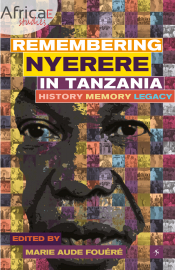
Mwalimu Nyerere Day is a commemorative holiday in Tanzania, honoring the life and legacy of Julius Nyerere, the country’s first president and a prominent African leader. This day is celebrated on October 14th each year, marking Nyerere’s birth anniversary.
Mwalimu Nyerere was instrumental in leading Tanzania to independence and promoting unity and socialism in the country. His leadership style and commitment to social justice continue to inspire people in Tanzania and beyond. On Mwalimu Nyerere Day, various events and activities are organized to remember and honor his contributions, including speeches, discussions, exhibitions, and cultural performances.
It serves as a day of reflection and appreciation for Nyerere’s impact on Tanzania’s history and development as a nation.
Remembering A Visionary Leader
Mwalimu Nyerere Day is a special commemoration day in Tanzania to remember the remarkable contributions of Julius Kambarage Nyerere, a visionary leader and founding father of the nation. Born in 1922, Nyerere’s early life was shaped by his education, attending local missionary schools, and later pursuing higher education abroad in Britain. During this period, he developed a strong sense of nationalism and dedication to the welfare of his people.
Nyerere played a crucial role in Tanzania’s fight for independence against colonial rule. As the Tanganyika African National Union (TANU) leader, he led peaceful demonstrations and negotiations and mobilized the masses in the struggle for self-rule. His resolute commitment towards unity and liberation earned him the respect and support of Tanzanians, eventually leading to independence in 1961.
Nyerere’s philosophy and ideology, known as Ujamaa, greatly influenced his leadership. Ujamaa, which means “familyhood” in Swahili, emphasizes social cohesion, self-reliance, and egalitarianism. The ideology aimed to build a socialist society that prioritized collective responsibility, cooperation, and equitable distribution of resources. Throughout his presidency, Nyerere implemented policies to promote education, healthcare, and rural development, striving to improve the lives of all Tanzanians.

Credit: nasseryouthmovement.net
Celebrating Mwalimu Nyerere’s Achievements
Celebrating Mwalimu Nyerere’s achievements, this special day honors the legacy of Julius Kambarage Nyerere, the first President of Tanzania. Nyerere’s implementation of Ujamaa, Tanzania’s unique socialist model, remains an important part of his contribution. The Ujamaa system aimed to create a self-reliant and egalitarian society through communal ownership and collective decision-making.
Another significant achievement of Nyerere was the introduction of free education in Tanzania. This visionary move profoundly impacted Tanzanian society, providing access to education for all, irrespective of socio-economic background. It fostered a literate and knowledgeable population and promoted social equality.
Nyerere’s commitment to Pan-Africanism further establishes his remarkable influence. He played a pivotal role in forming the African Union, advocating for unity and cooperation among African nations. His Pan-Africanist ideologies promoted solidarity and identity, laying the foundation for a stronger African continent.
Continuing Mwalimu Nyerere’s Legacy
Mwalimu Nyerere Day is a special occasion in Tanzania, honoring the legacy of the country’s first President, Julius Nyerere. His ideas and leadership have impacted Tanzania, shaping the nation’s development and values.
Nyerere emphasized the importance of unity, self-reliance, and social justice. Today, Tanzania continues to embrace these ideals, working towards inclusive growth and equitable distribution of resources. Mwalimu Nyerere’s influence extends beyond Tanzania, as efforts are made to promote his vision and principles in Africa and beyond.
Many organizations and individuals strive to uphold Nyerere’s belief in Pan-Africanism and the liberation of the African continent from colonialism. They champion Nyerere’s call for African self-determination and solidarity. Mwalimu Nyerere Day serves as a reminder of the enduring legacy of a remarkable leader.
Frequently Asked Questions Of Mwalimu Nyerere Day
What Is The Meaning Of Nyerere Day?
Nyerere Day commemorates Julius Nyerere, Tanzania’s first president, who led the country to independence and promoted socialism. It is celebrated on October 14 each year to honor his contributions to Tanzanian history and development.
When Was Nyerere Born?
Nyerere was born on October 13, 1922.
What Was The Significance Of Nyerere Ujamaa Philosophy?
Nyerere’s Ujamaa philosophy aimed to establish a socialist society in Tanzania through communal farming and self-reliance. It promoted equality, solidarity, and cooperation among citizens, fostering national unity and economic development.
What Is The Story Of Nyerere?
Nyerere was a prominent figure in Tanzanian history, serving as its first president from 1964 to 1985. He was known for his philosophy of African socialism called Ujamaa, which aimed to create a self-reliant and equitable society. Nyerere’s leadership and efforts in promoting education and national unity are still widely respected today.
Conclusion
Mwalimu Nyerere Day is an important occasion that allows us to reflect on the incredible legacy of Julius Kambarage Nyerere, the first President of Tanzania. His vision and leadership continue to inspire generations, reminding us of the importance of selfless service and commitment to social justice.
By commemorating this day, we honor his remarkable contributions and strive to carry forward his ideals. Let us all work towards creating a better future, guided by the principles that Mwalimu Nyerere stood for.





